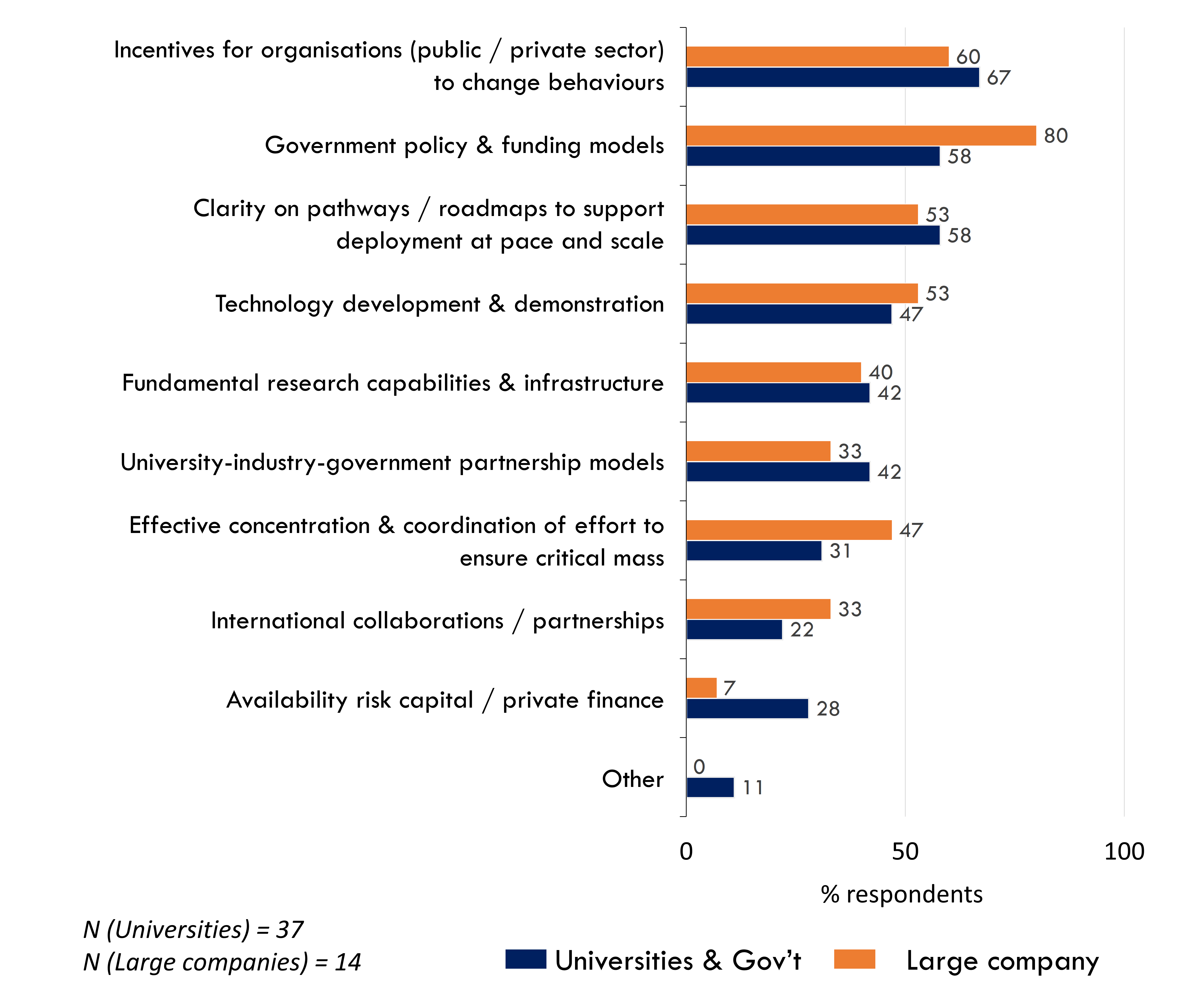Unleashing the Potential of Partnerships to Tackle Climate Change

The Race to Net Zero
by Marla Fuchs and Tomas Ulrichsen at the University Commercialisation and Innovation Policy Evidence Unit
29th October 2021
While the world’s attention in 2020-21 has been drawn towards responses mitigating the health and socio-economic effects of COVID-19, the climate crisis continues to develop. As we begin to look beyond the immediate effects of the pandemic, efforts to accelerate the global response to climate change are returning to centre stage.
In November 2021 the UK will host perhaps the most important UN Climate Change Conference of the Parties (COP26) since the Paris Agreement in 2015.
Over 130 countries have announced intentions to achieve net-zero emissions by 2050. However, delivering on these ambitions will require a profound energy transformation within national economies and across global industries. It will require transformative changes to our behaviours as individuals and societies, the development and deployment of a wide range of technologies at unprecedented pace and scale and the ability to reduce and remove greenhouse gas emissions. Echoing the words of Alok Sharma, President of COP26, in a speech to the Net Zero Summit in March 2021 that “it is time for the world to move from a decade of climate change deliberation to a decade of delivery”.
Accelerating the process of innovation in all areas of the economy – across industries, supply chains, and product lifecycles – must be a central pillar of action for tackling the climate crisis. And this needs to include not just new products and services, but also new ways of producing them, organising activity, and new ways of distributing and supplying products. We also need to rapidly accelerate the diffusion of successful innovations around the system to deliver widespread impacts.
As the response to COVID-19 has demonstrated, universities – working in close partnership with industry, government, investors, community groups and others – have the potential to play a critical role in accelerating innovation to find practical solutions to help us reach net zero.
What do we need to do now?
How we better mobilise this partnership to tackle the climate crisis was a key focus of the recent Oxford Summit in July 2021.
We know that many factors are important in shaping the ability to universities, companies, governments and others to come together to innovate. In advance of the Summit, the University Commercialisation and Innovation Policy Evidence Unit (UCI) at the University of Cambridge surveyed 37 universities and 14 large companies in the US and UK with the support of the University-Industry Demonstration Partnership to get their views on which areas required the greatest improvement in order to better mobilise these types of partnerships to mitigate the impacts of climate change.
The results are captured in Figure 1 below. Perhaps most strikingly, there was a strong consensus between universities and large companies on where we need to invest our time and effort to change and improve.

Figure 1: Areas of greatest need for change to better mobilise university-industry-government partnerships to develop solutions to tackle the climate crisis
Note: the results do not say anything about the importance of different factors; they identify where we need to do better to strengthen the ability of universities, companies, governments and others to work together to tackle the climate crisis.
One of the most highly cited areas where we need to change is around creating better incentives for organisations in the public and private sectors to change their behaviours. We all know that tackling the climate crisis will require substantial changes to how we, as individuals and organisations, behave and what we prioritise. However, it is unlikely that the magnitude of change required can be delivered without changing economic or social incentives.
The second major area highlighted was the need for better government policies and funding programmes, with almost 6 in 10 universities, and 8 in 10 large companies, identifying this as an important category. Accelerating the development of innovative solutions to climate change requires funding programmes and policies that not only enable the development of new technologies, but also work effectively to support their further development and demonstration to the point where the private sector is able and willing to co-invest and take them forward. It is also now well-known that government policies and procurement practices can help to de-risk the commercialisation process for emerging technologies by helping to create early demand for these products and services.
Almost half of large company respondents to the survey also highlighted that efforts to tackle climate change should be more concentrated and better coordinated to ensure a critical mass of activity. Note, by comparison just 31% of university respondents agreed. This has implications for the design of future funding programmes to achieve net zero.
The third major area identified by the survey respondents was around the need for greater clarity on how we are going to get from where we are, to where we need to be. Among other things, roadmaps can help to provide greater certainty for companies, universities and others to invest; clarity on what needs to be done and whether there are sequencing issues that need to be resolved; can help build communities and networks around key topics; and reveal how advances in one area depend on advances and changes elsewhere in the system for the solution to be deployed in practice at scale to drive real change.
To accelerate the pace of innovation to tackle the climate crisis, we also need to get better at technology development and demonstration; the phases of the innovation process beyond research where technologies are developed into prototypes and their potential functionality is demonstrated in increasingly real-world environments. In the context of university-industry partnerships, it is during this phase, that technologies typically begin to transition out of a university environment and into a more commercial one, and where the drivers for continued investment and development become increasingly commercial. It is one of the most costly and risky stages of the development process where a key focus is on reducing the variety of technological, production, and commercial risks to produce a commercially viable product or service. Evidence suggests that it is during this phase that many technologies fail, leading to many referring to it as the commercialisation ‘valley of death’.
Emerging initiatives to catalyse solutions for net zero at pace and scale
Encouragingly we are seeing many initiatives emerging which, in different ways, work to address some of these challenges. For example, the strategic partnership between Siemens and the University of Birmingham will focus work to accelerate and deliver the university’s roadmap towards net zero by rolling out Internet of Things (IoT) technology at scale to develop a ‘smart campus’ and create a ‘Living Lab’ where their research and teaching will benefit from access to new data and connectivity.
Meanwhile, at the University of Cambridge, Professor Rob Miller, Director of the Whittle Lab, has spent the last several years working to dramatically reduce the time needed to develop, demonstrate and deploy technologies to transform and decarbonise aviation. Inspired by Formula 1 engineering approaches, he developed a rapid technology development approach that he piloted with Rolls Royce; it reduced development times from 2 years to one week. Core to this new way of working was assembling the right mix of capabilities and facilities in the same place and removing the key barriers that typically hamper collaborations, notably: communication, bureaucracy and top-down management. Building on this approach, Professor Miller is co-leading the Aviation Impact Accelerator (AIA), which will be launched at COP26. The AIA will bring together experts in aerospace, economics, policy and climate science, from both academia and industry, to build an interactive simulator able to take a whole-systems approach to developing scenarios, to help deliver net zero flight.
Government funding programmes that prioritise tackling critical industry challenges are also being leveraged to accelerate the transition to net zero. For example, a partnership consisting of bp, Johnson Matthey, Cardiff University and The University of Manchester is venturing into a £9m project to convert CO2, waste and sustainable biomass into fuel and products that can be used across the energy and transportation sectors. This type of transformation will be critical to delivering on net zero ambitions. The partnership was enabled by UK Engineering and Physical Sciences Research Council’s business-led ‘Prosperity Partnerships’ that focus on co-creation and co-delivery of research to meet key industrial needs.
The UK National Centre for Universities and Business recently published a report capturing many other examples of universities, companies and other organisations coming together to tackle issues around climate change.
Finally, referring back to Figure 1, also interesting are the areas at the bottom of the list. This suggests that, at least for this sample of universities and large companies based in the US and UK, these areas are largely seen as functioning well. Most striking is that while much attention is often placed on the availability of private sector finance and risk capital as a major barrier to innovation, at least for the types of organisations at the heart of many large university-industry collaborative R&D and innovation partnerships, other factors need to be more urgently addressed to accelerate the pace at which they can work together to tackle the climate crisis.
Mobilising partnerships with the urgency and purpose to tackle climate change
Universities, companies, investors, governments and others came together with a sense of urgency and common purpose to develop and deploy innovations at both pace and scale to tackle the COVID-19 pandemic. We now need to find ways of developing a similar sense of urgency and common purpose to tackle climate change. As the world gathers for COP26 to agree coordinated action to tackle the climate crisis, we must make the necessary changes to ensure that university-industry-government partnerships become the powerhouses they have the potential to be for driving the transition to a net zero economy.









